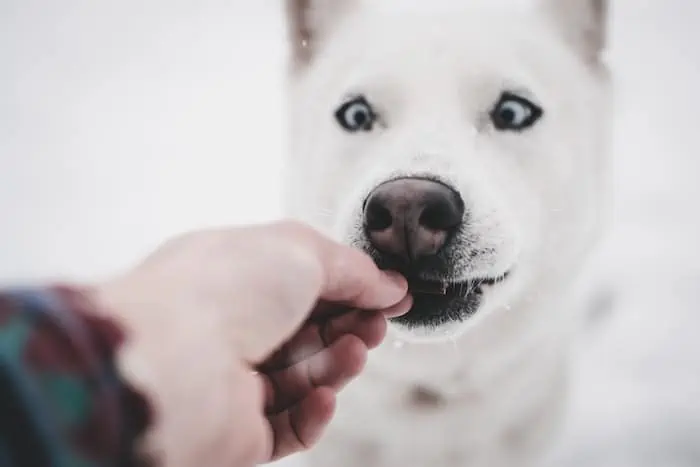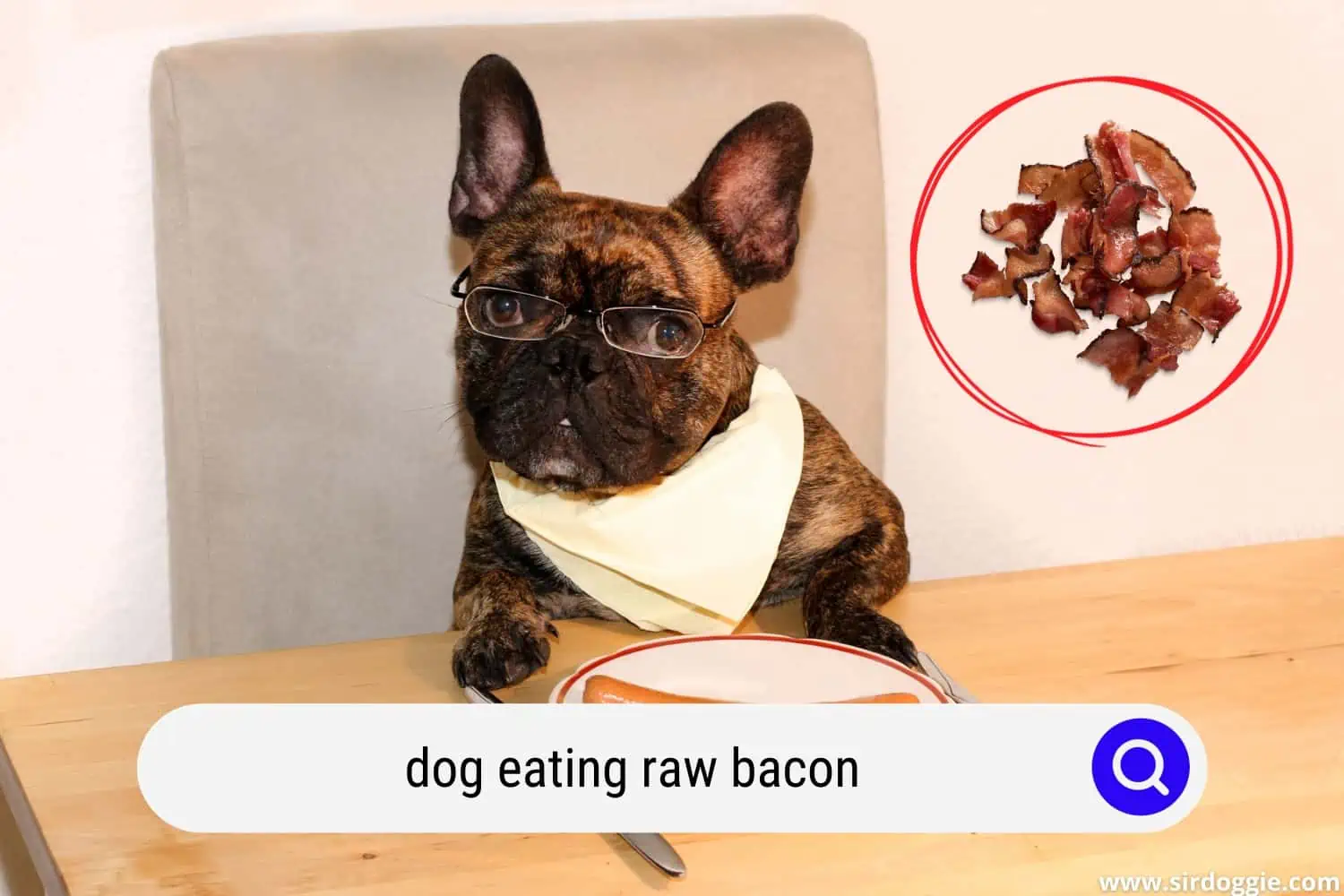Can Dogs Eat Raw Bacon? (Detailed Explanation)
Bacon is a delicious, meaty treat for humans. We all know that dogs adore human foods, but not all human meals are beneficial or particularly safe for them.
Dogs are known to enjoy bacon of all types, but can dogs safely consume raw bacon?

Due to the numerous health risks involved with feeding raw bacon to dogs, it’s strongly advised that your dog should never eat it. The top risk associated with raw bacon is the significant number of harmful bacteria and parasites that can be found in uncooked meat, so it is best to avoid giving raw bacon to your furry companions.
Read on for more information about how to safely feed raw bacon to your dog, when to avoid feeding it to them at all costs, and the health-related pros and cons of this fatty treat for both dogs and people.
Some dogs may be unable to eat bacon at all
While the majority of healthy dogs can consume just a small quantity of raw bacon without compromising their general health and well-being, some dog breeds are susceptible to GI-related allergies or other health issues, so raw bacon should be avoided entirely in those specific breeds (such as Labrador Retrievers and West Highland Terriers).
Raw bacon can be a very lucrative reward, so every dog generally wants it at some point. However, it is the responsibility of the owner to avoid giving uncooked bacon to your canine companions.
Is it safe for dogs to consume raw bacon?
Raw bacon should not be fed to dogs since its safety has not been fully established. While a little slice of bacon is generally considered safe for your dog to ingest, you should avoid providing them with a significant amount of feeding them raw bacon daily.
Additionally, because raw bacon contains both high salt and high fat content, it should not be given to dogs daily or even regularly because it can make them obese and will cause cardiovascular issues. Salt and fat are dangerous to dogs because their canine bodies absorb salt and fat far more rapidly than human bodies and they are therefore more prone to experiencing the negative effects of each of both.
Also, certain breeds of dogs that are suffering from particular health issues should never be fed raw bacon. For instance, any dog suffering from pancreatitis should avoid bacon since the high-fat content of the meat may trigger a flare-up of the ailment.
What are the benefits of raw bacon for dogs?
Only the meaty parts of raw bacon are remotely good for canines and provide some nutritional content. Otherwise, owners need to avoid giving raw bacon under any circumstances because consuming fatty and/or salty meals is detrimental to your puppy’s health and can result in obesity and heart disease, as discussed above.
Unfortunately, many dogs are also allergic to fatty foods, which is a shame because these foods are delectable for humans. If puppies puke after eating bacon, they should not be fed bacon in the future. Kindly consult your veterinarian immediately if your dog vomits after consuming raw bacon.
In what situations is raw bacon harmful to dogs?

Eating bacon in large quantities or regularly is just as damaging to dogs as it is to people.
The first and most obvious downside of bacon is its high fat content, which varies depending on the type of bacon. To have a good amount of adequate energy, dogs must ingest fat in the form of “good” fats—such as poly-unsaturated fatty acids—rather than “bad” fats like the trans-fatty acids present in raw bacon.
Compared to other types of bacon, pork bacon is exceptionally high in saturated fat and cholesterol. Experts have been unable to determine if cholesterol and saturated fat induce heart disease in dogs at the same rate as they do in people; nonetheless, it is assumed that they still do some harm. Since dogs’ arteries are less prone to obstruction than human arteries, there are chances that your dog may show no sign of heart disease at the very start.
However, with time, if you continue giving raw pork bacon to your dogs regularly, it may lead to diabetes, cancer, a heart attack, or other cardiovascular issues. Raw pork bacon also puts your canine companion at risk for a parasitic infection known as trichinosis.
Dogs that have previously suffered from pancreatitis must avoid fatty foods for the rest of their lives. Pancreatitis can develop in your dog if he consumes an abnormally large quantity of fat in a short period (acute pancreatitis), or it can develop gradually over time even if he consumes only a few fatty meals each day (chronic pancreatitis).
Apart from that, when processed meats such as bacon, salami, and sausages are consumed in large quantities, they have been linked to the development of bowel cancer and an increased risk of stomach cancer.
Bacon has a significant amount of salt and preservatives—the majority of which are nitrates—making it a calorie-dense meal. Bacon also has a high sodium level due to the high salt concentration in the meat. While your dog requires some salt in their diet, giving them too much salt (such as in the form of raw bacon) can make them unwell, dehydrate them, and even cause sodium poisoning if consumed in large amounts.
If your pooch is healthy and eating a balanced diet while getting enough activity, a small slice of bacon now and then should be perfectly alright as long as they are not overweight. Moderation is critical for animals, just as it is for people.
FAQs
What is the most effective method of feeding raw bacon to your dog?
Try to give a very thin and small piece of raw bacon to your canine, if you so choose. But before giving it to the dog, make sure the bacon is as fresh as possible, of high quality, and has been stored correctly. However, it is best not to make a habit of feeding raw bacon to your canine due to its vast detrimental effects.

What happens if my dog eats raw bacon?
A small quantity of raw bacon is unlikely to cause any issues, but try to avoid giving it regularly.
Some dogs may experience allergic reactions or vomit after eating raw bacon, so always contact your veterinarian if your dog shows signs of a significant negative reaction to raw foods, bacon, or any other new or unusual treats he may consume.
Can dogs get worms from eating raw bacon?
Yes, dogs can get worms from raw pork bacon. Trichinella, a species of worm larvae, has the potential to contaminate raw pork, including bacon. Even though commercial bacon makers smoke and cure their bacon before selling it to the public, smoking, and curing do not always eliminate Trichinella.
With this risk still prevailing, always try to buy high quality and safe uncooked bacon from an excellent vendor.
What kind of raw meat is good for dogs?
In addition to muscle meat (chicken/turkey), dogs should consume various organ meats (heart/liver/kidneys), entire fish, and raw meaty bones. Besides calcium and phosphate from the raw meaty bones, your dog will also benefit from the critical essential nutrients found in the organs and flesh. It is not recommended to feed your dog cooked bones since the heating process makes the bones brittle and susceptible to splintering, which is detrimental to your dog’s health and can cause significant damage to their insides.
Nowadays, the BARF diet is widely regarded as the best raw food for dogs of all breeds. This acronym stands for “Biologically Appropriate Raw Food” and “Bones and Raw Food,” indicating the ideal diet inclusions mentioned above.
The fundamental principles are the same regardless of whichever technique you choose when feeding your dogs: dogs’ meals should be natural, unadulterated, whole food-based, and raw.
The benefits of raw feeding
Many owners prefer to offer raw food to their pets since it is more natural and less processed than most commercial pet meals on the market today. Others provide raw food diets to their dogs because it makes sense that if they feed themselves a healthy balanced diet, they should feed their pets in the same manner.
Others feed raw simply due to their dogs enjoying it so much! There are several health benefits of giving raw food to pets, including:
Strengthened immune system
When it comes to fending off sickness, the immune system is the first line of protection. To help our dogs’ immune systems develop, you must provide them with a raw diet that is complete and balanced. All-natural ingredients add the benefit of being readily digestible for your dog.
Improved skin and softer, shinier coat
The correct amount of protein and healthy fats in meat may give your dog a shiny coat and may help alleviate skin problems. Many nutrients in raw meat enhance skin and coat health, with omega-3 fatty acids being one of the most well-known and investigated ingredients.
Healthy omega fats help dogs with allergies and inflammatory skin disorders by promoting healthy skin and a soft coat and offering anti-inflammatory effects. Salmon and other fish are all excellent sources of essential omega-3 fatty acids.
Superior dental health
Raw meaty chews are an excellent natural method to supplement your pet’s dental treatment. It is a pleasant and nutritious option for tooth cleaning, entertainment, and breath freshening all at once.
Reduced stool volume and odor
Dogs’ digestive systems are intended to extract as many beneficial elements as possible from their food. When your pet eats a diet made up of highly digestible raw meat, it is absorbed and utilized efficiently, resulting in less waste coming out the other end.
Better digestion
Dogs tend to absorb raw, natural meat more efficiently. Furthermore, there are no additional sugars, bulking agents, or derivatives found in raw meat—creating fewer digestive difficulties in our dogs.
In terms of bacon, try to avoid giving it to your dogs entirely. But if you insist on providing bacon to your dog, opt instead for cooked bacon—it has an excellent texture and an abundance of flavor, along with a low risk of transmitting diseases. Additionally, when appropriately cooked, it smells great—and we know that our canine companions’ sense of smell is between 10,000 and 100,000 times that of humans, so we can easily assume that cooked bacon smells just as lovely and appealing to them as raw bacon.

Family Dog Expert Author
Hi there! I’m Stuart, a devoted dog lover and family dog expert with over a decade of experience working with our furry companions. My passion for dogs drives me to share my knowledge and expertise, helping families build strong, loving bonds with their four-legged friends. When I’m not writing for SirDoggie, you’ll find me hiking, playing with my beautiful dog, or studying music.